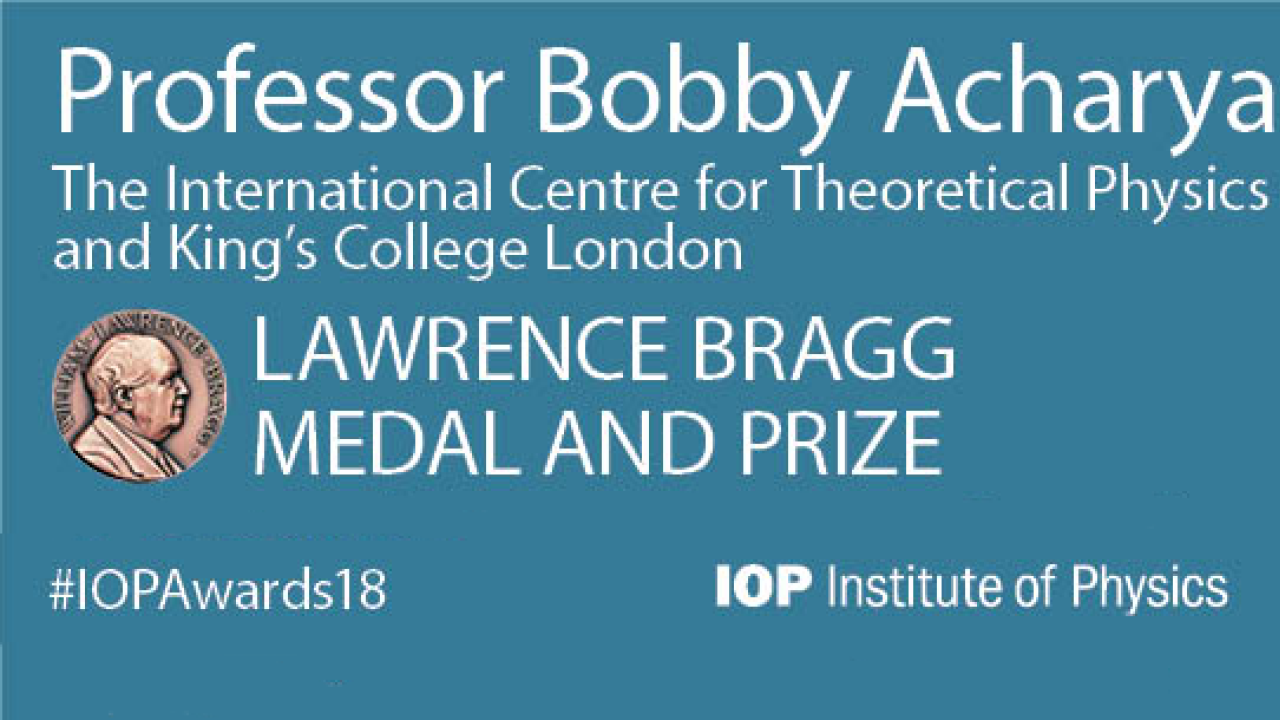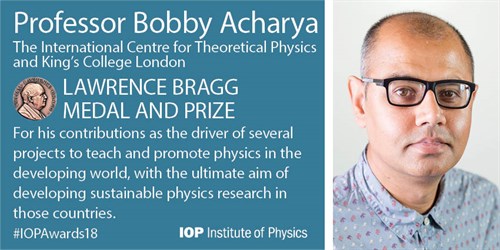
A warm congratulations to Bobby Acharya of ICTP's High Energy, Cosmology, and Astroparticle Physics section, on being honored with the Institute of Physics' 2018 Lawrence Bragg Medal and Prize.
Awarded Wednesday, the Prize recognizes Acharya's commitment and hard work on several projects to teach and promote physics in the developing world, with the ultimate aim of developing sustainable physics research communities there. The Insitute of Physics (IOP) cites Acharya's work on the recurrant African School of Physics, teaching and training in Palestine across many years, and setting up an ATLAS experiment group at ICTP. The Prize also singled out work Acharya has done as the co-coordinator of the ICTP Physics Without Frontiers Program, together with Kate Shaw, bringing physics outreach, workshops, and courses all over the world. The full citation is below. Congratulations!

Lawrence Bragg Medal and Prize
For his contributions as the driver of several projects to teach and promote physics in the developing world, with the ultimate aim of developing sustainable physics research in those countries.
Professor Bobby Acharya emerged from the developing world, his family of Indian origin, expelled from Uganda. A leading researcher in string theory and in the phenomenology of models derived from M-theory, he creates educational opportunities in the developing world, developing local sustainability with a high ratio of women involved in the various activities:
ATLAS at ICTP
Acharya realised that CERN could place students from the developing world into international teams. In 2006, he set up an ICTP group, in close collaboration with the INFN and the University of Udine, which is still actively working on the ATLAS experiment at the Large Hadron Collider. More than 50% of Acharya's PhD students and postdocs emerged from this route, with most still working in the field
Teaching and Training in Palestine
In 2013, Acharya started an annual course at Birzeit University in the West Bank. This 45-hour particle-physics course is taught to Masters students, assisted by postdoc volunteers. The course is extremely successful with grades significantly higher than those of equivalent UK students
Most of the students are female, several now undertaking PhDs in well-recognised European groups. Some work on the SESAME synchrotron in Jordan. As a direct result of this work, the number of Palestinian CERN users increased from one in 2010 to seven in 2016. There is now a dozen-strong particle physics network in Palestine
Physics Without Frontiers
The Palestinian model is portable - with postdoc volunteers based in the country, lectures are delivered live via internet video. Acharya, with Dr. Kate Shaw, organises and offers similar courses throughout the developing world. Successful courses in Tunisia, Venezuela and Nepal are being followed by many more under ICTP's ‘Physics Without Frontiers’ programme, coordinated by Acharya and Shaw. Programmes include masterclasses for budding scientists - and these have taken place in Algeria, Colombia, Egypt, Palestine, Lebanon, Nepal, Venezuela and Vietnam - working with postdocs from the host countries
The African School of Fundamental Physics and Applications is a one-month graduate summer school which occurs biannually in a different African country. The idea was conceived in 2008 by Acharya and Ketevi Assamagan at Brookhaven National Laboratory in the US, and provides courses in fundamental physics and applications to the brightest young African physicists, with the students 100% sponsored. Schools were in South Africa, Ghana, Senegal, Rwanda, with Namibia set for 2018. Around 65 students from all over Africa attend these schools, more than 30% of whom are female.













